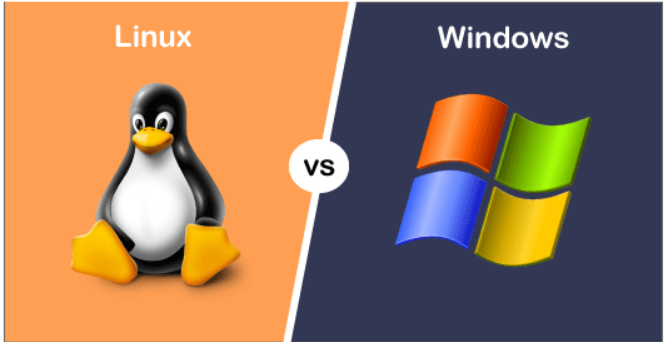Linux vs. Windows has always been one of the most frequently asked questions related to the operating system. Users often get confused about which one is better for them. There is diversity between the users as most users prefer the graphical user interface (GUI) and most command-line interface (CLI). There are many disagreements and acrimonious behavior among users, and it seems that it will be forever.
What is an operating system?
An operating system, or OS, is a type of software that controls and manages the resources of a computer, such as memory and storage. It acts as a liaison between the physical hardware of the machine and the programs that run on it. The OS manages tasks like memory allocation, and input and output operations and provides a user interface. Some examples of well-known OS include Windows, Linux, and macOS.
What is Linux?
Linux is an open-source operating system. As it is open-source, it is special and different from other operating systems, which means that you can customize it by editing source code. It provides programming as well as a graphical user interface. Linux is built by Linux Torvalds because he wanted to create a free operating system kernel that anyone can use.

Linux is a collection of operating systems that are based on Linux kernel. The first version of Linux was released in the year 1991. The Linux system is most commonly used for servers; however, it is available in desktop versions as well.
- Linux uses a monolithic kernel. It runs both kernel and user services in the same address space. It has many distributions such as Ubuntu, Linux mint, Fedora, etc.
- Linux was written in C language and assembly language. It is more machine friendly, which means users find it difficult to interact with Linux.
- Linux has become the largest open-source software in the world. It provides high security and is mostly used for hacking purposes.
- Some of the features of Linux include its Portability, Security, and Multitasking abilities. Plus, Linux is open source.
Ubuntu, Devian, and Fedora are some popular Linux distributions. Also, we have SUSE Linux Enterprise Server (SLES) and RedHat Enterprise Linux for the commercial distribution of Linux. As it is open-source, we can modify the source code and make variations in the operating system.
| Advantages | Disadvantages |
|---|---|
| ✔ Mostly free | ✘ Limited range of software |
| ✔ Mostly open source | ✘ Significant barriers to entry for those with little IT knowledge |
| ✔ Very stable | |
| ✔ Extensive configuration possibilities |
What is Windows?
Windows is known as an operating system that was designed and developed by Microsoft Corporation for the purpose of running computers smoothly. It is one of the most reputed and popular computer operating systems around the world.
GUI (Graphical User Interface) is an important element of the Windows operating system that has played an important role in its success. With the help of GUI, users can access applications quickly.
Windows operating system is a software program designed to control, coordinate and manipulate all desktop publishing operations. It acts as an interface between the hardware and other software on the computer system. Allocation of memory locations to data and other computer tasks is included in its work. During data processing operations, resources like files and programs, input/output devices, computer memories, etc., are controlled by it. In addition, it can carry out the diagnosis of hardware and software for the detection of faults and errors.

- Windows is not open-source. Its free version lacks some of the features that the licensed version has.
- Windows is the most widely used operating system in PCs. It provides a GUI which is very user-friendly. It is available in two versions, i.e., 32 bit and 64 bit. It has both client and server versions.
- Windows uses a microkernel. Its address space is separated into kernel space and user space. Windows is designed in such a way that people with no programming knowledge can also use it.
- It is good for both personal and commercial use because it is very simple and easy to use.
- Windows was written in C++ and Assembly language. Windows provides less security as compared to Linux.
- Some of the features of Windows include: Control panel, File explorer, Internet Browser, Disk cleanup features, and a highly user friendly Interface.
Microsoft has developed many Windows versions. Some popular names are Windows XP, Windows Vista, Windows 95, Windows 7, 8, and 10, from which Windows 7, 8, and 10 are the common names that are being used nowadays. These versions are available in 32 bits and 64 bits.
Despite many features added to the Windows operating system from time to time according to the demands to address modern computing, there has not been much change in its architecture since its first version.
| Advantages | Disadvantages |
|---|---|
| ✔ Beginner-friendly | ✘ Overly complex |
| ✔ Large range of software | ✘ More frequently targeted by malware |
| ✔ Pre-installed on many devices | ✘ Not open source |
| ✔ Comprehensive driver support | ✘ Cost of licenses |
Differences: Linux and Windows Operating Systems (Linux vs. Windows)
The following table highlights the major differences between the Linux and Windows operating systems (Linux vs. Windows) −
| Parameter | Linux | Windows |
|---|---|---|
| Definition | Linux is an open-source operating system developed for desktops | Windows is an operating system developed for desktops |
| Developed by | Linus Torvalds | Microsoft |
| Availability | Open-source and free of cost | Not an open-source and it is paid |
| Ease of use | Linux is machine-friendly. So user must have some exposure to Linux commands. It takes more time for users to get used to Linux | Windows is simple with rich GUI options. User doesn’t need any knowledge of programming. It is more useful for non-technical users. |
| Kernel type | Monolithic kernel | Microkernel |
| Path separator | Forward slash is used as a path separator | Backward slash is used as a path separator |
| Security | Linux is more secure than Windows | Windows is less secure compared to Linux |
| Case sensitivity | Linux is highly case-sensitive | Windows is not case sensitive |
| Updates | Linux updates less frequently | Windows updates frequently |
| Written in | Linux is written in C and Assembly language | Windows is written in C++ and Assembly language |
| License | Linux is distributed under GPL(GNU General Public License) license | Windows is distributed under Proprietary commercial software license |
| Reliability | Linux is more reliable than windows as it is more secured | Windows is not much reliable as Linux |
| File system | Linux uses tree structure to store files. In Linux everything is considered as a file | Windows uses directories such as C, D, E and more and folders are used to store files |
| Types of users | RegularAdministrativeService | AdministratorStandardChildGuest |
| Speed | Linux is faster than windows | Windows is slower compared to Linux |
| Command line | Here, the command line is referred to as a Terminal which is very useful and perform various tasks | Windows also have a command prompt which is not as effective as Terminal.Users use GUI to perform their tasks |
| Installation | Linux installation setup is a bit complicated but it takes less time to install | Windows is easy to setup but takes more time to install |
Which operating system is the best for you? Linux or windows?
The choice between Linux and Windows as an operating system (OS) depends on the user’s needs and preferences. Linux is a popular choice for developers and those who prefer open-source software, as the source code is freely available for modification and distribution.
Linux is also known for its stability and security, as well as its ability to run on a wide range of hardware. On the other hand, Windows is the most widely used OS in the world and is known for its ease of use and compatibility with a wide range of software, including popular games and productivity tools. Windows is also well-supported by many hardware manufacturers.
For users who are looking for a free OS, Linux is a clear choice. Many Linux distributions, such as Ubuntu and Mint, can be downloaded and used without any cost. Windows, on the other hand, requires a license and can be quite expensive. Additionally, Linux is often considered to be more customizable than Windows, and users can easily customize the look and feel of their desktop environment.
Another important factor to consider is the type of work you will be doing. If you are a developer, Linux is often the preferred choice as it provides a wide range of development tools and a strong community of developers. Many popular programming languages such as Python and Java have better support on Linux than on Windows. However, for users who rely on proprietary software like Adobe Photoshop, Windows is the better choice as it has better support for these types of applications.
In terms of security, Linux is considered to be more secure than Windows as it is less susceptible to viruses and malware. Windows, being the most popular OS in the world, is a more common target for cyber-attacks. However, Windows has made significant improvements in security over the years and is now considered to be more secure than it was in the past.
Ultimately, the choice between Linux and Windows as an OS comes down to the user’s needs and preferences. Both have their own strengths and weaknesses, and the best choice will depend on the type of work you will be doing, your budget, and your personal preferences.
Linux vs. Windows Linux vs. Windows Linux vs. Windows Linux vs. Windows Linux vs. Windows Linux vs. Windows Linux vs. Windows Linux vs. Windows Linux vs. Windows Linux vs. Windows Linux vs. Windows Linux vs. Windows



